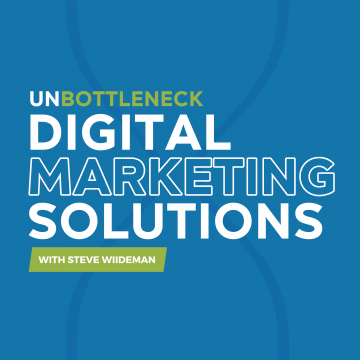Podcast: Play in new window | Download
Unbottleneck Shop Talk: Alan Bleiweiss & The SEO User Experience
In this episode, SEO Experts Steve Wiideman and Alan Bleiweiss are joining forces for an insightful discussion about the correlation between website user experience and search engine rankings. SEO must be good for both Google and the humans that use search engines!
About Our Guest
With over 25 years of SEO experience, Alan Bleiweiss is known as the “audit guy” providing thorough website audits of client’s websites. These continue to lead to sustainable SEO success. With these audits, he identifies the problem areas of a website and develops a plan to rectify these issues in a way that is not only beneficial to search engines such as Google and Bing, but to consumers who actively seek information.
Sponsored by Ryte
Featured In This Episode:
- How to Maximize Your Website’s User Experience
- Learning from Your Competition
- Optimizing for Conversions by Offering Help
- Choosing Pages over Blog Posts
Maximize Opportunities – User Experience and SEO
If you’re wondering why your website is having difficulty ranking in search engines, you may need to investigate your site’s user experience.
According to Bleiweiss, SEO is “an attempt by search engines to emulate human experiences”. When looking at SEO from this perspective, it is impossible to ignore the user experience that your website provides. If your site is providing a negative experience for human users, it’s fair to assume that it’s causing a negative experience for the search engine.
User experience includes:
- Page Speed – How fast or slow does your page load?
- Formatting – Are you breaking up large text in a way that is visually appealing and easy to read?
- Testimonials – Are you maximizing your credibility by highlighting reviews from previous clients?
- Internal Linking – Is there another page on the site that contains relevant information that may also be helpful?
- Jump Links – Are there links that will allow a user to return to the top of a page without scrolling?
- Short Summaries – Can common questions and concerns be summarized and found quickly on the page?
If your website fails to facilitate a pleasant user experience, it could be costing you a higher search engine ranking.
Competitor Analysis – Embrace the Competition
After putting time, money and effort into optimizing your website, it’s discouraging to still not move up in the ranking. A helpful practice search the competitors that are ranking on the first page in Google and Bing and see what attributes are working in their favor.
It’s crucial to conduct a competitor analysis through the eyes of your target market. Some elements can be as simple as color, graphics or site navigation, but it is imperative to take note of what your competitors are doing that’s working for the user and for the search engine.
Pro-Tip: For websites that offer good & services, price transparency could be a key component to explore on competitor’s pages. Does your website display pricing? If not, does your competitor’s display pricing? If so, this may be an element to incorporate on your website.
Conversion Optimization – “Don’t Sell…Help”
Are you helping potential customers find what they’re looking for? The goal of your website shouldn’t just be selling, but helping others find information that will help them make a purchase, educational or entertainment decision.
Shifting the mentality of selling to helping people will help build your credibility as a reliable source in your niche.
Ask yourself:
- What are the people who are buying my product looking for?
- What problems are they encountering?
Once you have answered these questions, you can start planning your content.
Seek to Create Strong Pages, Not Fading Blog Posts
Many businesses have embraced blogging as an opportunity to diversify their content and dive deeper into relevant topics. Blogging can be a nice touch to a site, but, if content is of consistent quality, make a page for it. As you post more content on your blog, it’s so easy for content to get buried.
If content is evergreen, or relevant for a long period of time, don’t be afraid to dedicate a page to it!
Follow Alan Bleiweiss:
Now it’s Your Turn
By taking the time to improve your website’s user experience, you are creating a brand that evokes trust.
Keep learning more SEO essentials. Follow Steve on LinkedIn!




